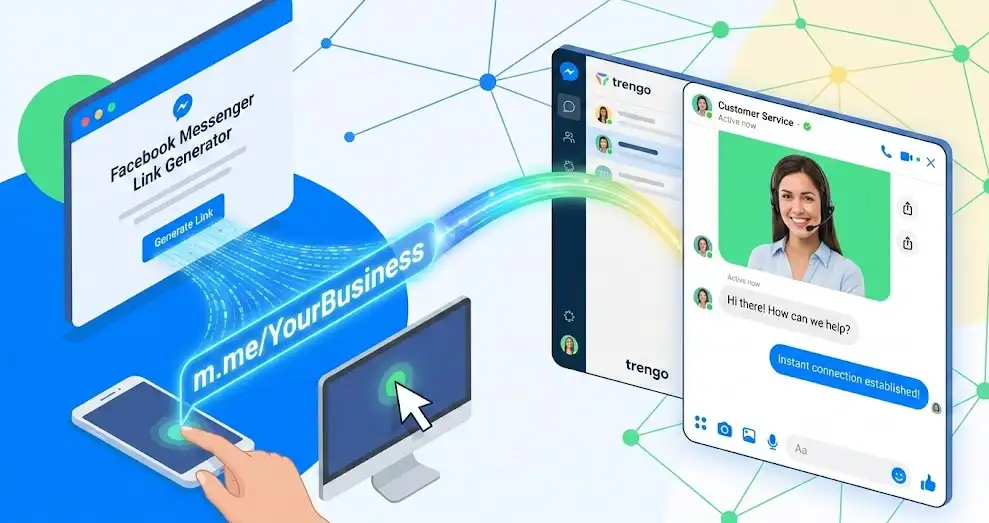When your customer service team feels overwhelmed by endless queues of support tickets, AI ticketing can be a game changer. AI-based ticketing systems don't just handle tickets, they transform your customer service interactions into meaningful, efficient conversations. By automating repetitive tasks, routing requests to the right team, and delivering insights in real time, AI ticketing enables your team to focus on what truly matters: creating exceptional customer experiences.
As 67% of businesses plan to increase their investment in AI over the next three years, embracing an AI ticketing system isn't just a trend, it's a strategic move for future growth in your business.
What is an AI-powered ticketing system?
An AI-powered ticketing system uses artificial intelligence to manage customer interactions. But what exactly do we mean by the term "tickets?”. It’s about turning customer requests into streamlined, productive conversations.
These systems can help you with tasks like:
- Classifying and routing: Automatically sort and assign conversations to the team member who has the best experience to respond.
- Conversation summaries: Quickly bring agents up to speed, saving time and enhancing response quality.
- Personalised assistance: Suggest tone adjustments or rewrite responses for clarity and alignment with brand voice.
By automating these processes, AI ticketing systems free up your team to focus on solving complex issues, improving both efficiency and customer experience.
Businesses adopting this technology benefit from more than just time saving. They build resilience and scalability into their customer support, ensuring consistent service even during peak periods.
Why is AI ticketing automation important?
Customer expectations for speed and personalisation are higher than ever. Hubspot research found that 90% of consumers rate an “immediate” response as the most important thing to them when they have a customer service question. Of the respondents, 60% of them defined “immediate” as 10 minutes or less.
AI ticketing automation helps you to meet these expectations by streamlining repetitive tasks like routing and organising conversations. This frees up your team to focus on resolving more complex customer inquiries.
By delivering faster responses and tailored support, AI-powered systems improve customer satisfaction and build loyalty. These systems also evolve with use, learning from interactions to deliver smarter, more efficient results.
Benefits of using AI ticketing system
An AI ticketing system can bring a tonne of advantages to your business. AI can help you move beyond traditional help desk solutions and transform your customer support into a more efficient and enjoyable experience for both staff and customers.
- Faster response times: AI reduces delays by suggesting replies, summarizing conversations, and even automating responses to common inquiries. This allows your customer support staff to address customer inquiries more quickly, improving the overall service experience.
- Lower strain on support teams: Sorting and routing tickets can consume valuable time and resources. AI automates these repetitive tasks, giving staff the bandwidth to focus on more complex and meaningful customer interactions.
- Enhanced customer satisfaction: AI-powered tools, like intelligent chatbots, provide immediate responses and empower customers with self-service options. Combined with faster resolutions, this creates a better experience that builds loyalty and trust.
Top 5 AI based ticketing systems reviewed
The right AI ticketing system can change the game for customer support. But the one that is right for your business will depend on the needs and goals of your team and business.
We’ve reviewed five top ticketing solutions that lead the way in AI-powered customer support. Here’s a breakdown of the best options on the market.
1. Trengo
Trengo is designed for businesses that want to centralise and optimise their customer support. It offers features like smart routing to assign conversations to the right agents, AI-powered summaries for quicker responses, and integrations with tools like WhatsApp and Slack. Trengo’s intuitive interface makes it easy for teams of all sizes to adopt, making it a favourite for scaling businesses.
Pros/cons
- Pros: User-friendly interface, robust AI tools like AI HelpMate and AI Journeys, and seamless multichannel integration.
- Cons: AI features like AI HelpMate require higher-tier plans.
Pricing
- Starts at €299 per month for 10 users
2. SysAid
SysAid is tailored for IT teams needing a reliable AI ticketing system. It automates core tasks like prioritising, assigning, and organising tickets. Additionally, SysAid includes SLA management for multiple departments and self-service portals that empower users to resolve simple issues on their own. With customisable templates and good reporting, it’s a good choice for IT service management.
Pricing
Contact SysAid for a custom quote.
Pros/cons
- Pros: Built-in ITIL templates, strong task automation, ideal for IT environments.
- Cons: Pricing details are not disclosed publicly.
3. Zendesk
Zendesk is great for handling high ticket volumes. It comes with advanced automation and reporting tools. Its AI features include intelligent routing and ticket prioritisation, ensuring customers are matched with the right agent. It also offers integrations and customisable dashboards, making it a solid choice for large enterprises.
Pricing
Starts at $55 but that's per agent/month.
Pros/cons
- Pros: Scalable for large teams, strong analytics and reporting tools, customizable.
- Cons: Higher-tier AI features can increase costs significantly.
4. Helpscout
Helpscout is a good option for teams focused on building personal relationships with customers. Its AI tools, like conversation summaries and writing suggestions can improve productivity while maintaining a human touch. Helpscout also offers user-friendly self-service portals and email integration, making it an option for small to mid-sized teams.
Pricing
Starts at $25 per user/month.
Pros/cons
- Pros: Simple setup, self-service tools for customers, enhances personal engagement.
- Cons: Lacks some advanced AI features found in larger platforms.
5. Tidio
Tidio combines live chat with AI-driven ticketing features, offering an affordable solution for small businesses. Its AI chatbots handle repetitive inquiries, while live customer service staff can take over more complex issues. Tidio’s user-friendly design makes it easy to implement, and its robust integrations enhance its versatility.
Pricing
Free plan available; paid plans start at $18 per user/month.
Pros/cons
- Pros: Affordable, ideal for small teams, excellent chatbot functionality.
- Cons: Limited scalability for larger enterprises or complex workflows.
Challenges of ticket systems without AI ticketing
Traditional ticket systems, while functional, often fall short when it comes to delivering the efficiency and personalisation modern customers expect. Here are some of the most common challenges businesses face when using systems without AI ticketing features.
Difficulty classifying and assigning tickets to the right agent
Without AI, manually reading and assigning tickets is a slow process that is prone to errors. Agents must review each request, determine its priority, and then route it to the right team. This can create delays, mis assignments, and a negative customer experience, especially during peak times.
In addition, traditional systems lack the ability to provide real-time insights into a ticket’s context. This forces team members to spend valuable time searching for relevant information. This inefficiency frustrates your staff but also negatively impacts the customer experience.
Lack of personalisation
Customers expect businesses to know their history and preferences. Traditional systems struggle to scale personalisation, leaving your staff to rely on manual efforts to retrieve customer data or prior interactions. This lack of context can result in generic, impersonal responses that fail to meet customer expectations.
AI ticketing, on the other hand, uses sentiment analysis and customer history to offer tailored suggestions. This helps your team deliver responses that feel thoughtful and relevant. Without AI, such personalisation at scale is nearly impossible.
Repetitive tickets
Handling repetitive inquiries is a major drain on your team's time and energy. Common issues like password resets or delivery updates often flood support systems. Traditional tools may include static self-help options, but they can’t offer the more in-depth conversational experience that AI chatbots provide.
By automating responses to frequent questions, AI reduces the volume of repetitive tickets your team needs to handle. This frees them to focus on more complex cases. Without this option, team members are often stuck addressing the same issues repeatedly, leading to burnout and slower resolutions.
Limited insights
Traditional ticketing systems generate vast amounts of data but often lack the tools to analyse it effectively. This means you can miss out on identifying trends, predicting customer needs, or improving operations proactively. Teams are then left reacting to problems rather than preventing them.
AI ticketing systems extract actionable insights from conversations, helping teams spot recurring issues, optimise workflows, and enhance decision-making. Without AI, valuable data remains unused, limiting the potential for strategic growth.
Inconsistent brand voice
New or overwhelmed staff often struggle to maintain a consistent tone aligned with the company’s brand. Traditional systems offer little support in guiding communication style, leading to inconsistencies in customer interactions.
AI-powered tools can assist by suggesting on-brand replies and adjusting tone to suit the context. This helps to make sure that every message resonates with the company’s voice, no matter who is behind the keyboard. Without AI, businesses risk eroding their brand identity through inconsistent communication.
AI ticketing system use cases and examples
AI ticketing systems are transforming customer service across industries. Here are some key use cases where AI ticketing works:
Travel and Hospitality
In travel and hospitality, AI ticketing systems streamline customer interactions, such as booking reservations or managing itinerary changes.
AI chatbots act as 24/7 virtual assistants, offering:
- personalised recommendations
- resolving inquiries in multiple languages
- simplifying the booking process
These systems enhance the travel experience by anticipating customer needs and reducing response times, which leads to higher satisfaction rates.
Healthcare
For healthcare providers, AI ticketing simplifies appointment scheduling and patient inquiries. AI chatbots handle routine tasks like booking or rescheduling visits, reducing the workload for administrative staff.
Automated reminders sent via email or SMS reduce missed appointments, while AI-powered insights help staff prioritise patient care. These systems free up resources for more complex and sensitive interactions, improving overall efficiency and patient satisfaction.
Retail and E-Commerce
Retailers can use AI ticketing to improve shopping experiences. AI-powered assistants guide customers through product searches, recommend items based on preferences, and provide quick answers to FAQs like order tracking or return policies.
These systems also help manage high volumes of support requests by routing them to the right agents or resolving simple queries automatically.
Education
Educational institutions benefit from AI ticketing by automating student and faculty support. AI chatbots can handle common queries about course registration, professor availability, or campus events, deflecting repetitive tickets from staff.
In addition, AI tools analyse student data to suggest relevant courses or programs. This improves the overall educational experience while freeing up administrative teams to focus on more strategic tasks.
Recruitment and Human Resources
In HR and recruitment, AI ticketing automates communications with job candidates, keeping them informed about their application status. AI can also assist in workforce management, such as scheduling shifts or managing seasonal hiring needs. These tools ensure smoother onboarding processes and improve candidate experiences while reducing the manual workload for HR teams.
Example in Action: Betersport
When online fitness retailer Betersport faced a surge in customer inquiries, they turned to Trengo’s AI ticketing system. By integrating all communication channels into one platform, they streamlined their processes, reduced duplicate responses, and improved team efficiency.
In addition, they implemented AI-driven bots to handle repetitive FAQs, saving their team significant time and allowing them to focus on complex inquiries.
Whether it’s automating routine tasks or enhancing personalisation, AI ticketing systems provide scalable solutions for businesses across industries, empowering teams to deliver faster, smarter, and more meaningful support.
Get started with AI Ticketing
Adopting an AI ticketing system is a game-changing step toward enhancing your customer support strategy. These systems automate routine tasks and empower your team to deliver faster, more personalised responses.
By centralising communication, providing actionable insights on your data, and maintaining a consistent brand voice, AI ticketing helps businesses meet the growing expectations of their customers.
Ready to transform the way you handle customer conversations? With solutions like Trengo, it’s easier than ever to get started. From streamlining workflows to reducing agent workload, AI ticketing lets your team focus on what matters most—building meaningful customer relationships.




.png)











